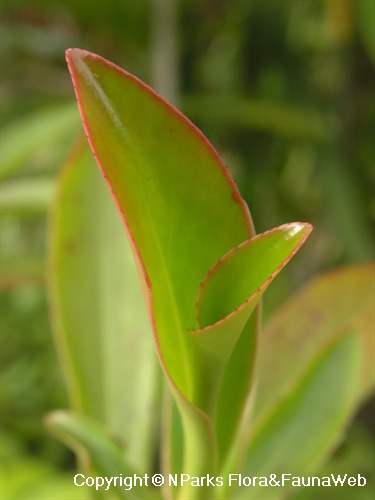.jpg)
Back
Ploiarium elegans Korth.
| Family Name: | Bonnetiaceae |
| Synonyms: | Ploiarium alternifolium |
| Common Name: | Cicada Tree, Riang Riang, Reriang, Kayu Kuat (Kuat Kuat), Keriang, Sesudu Paya |
Name
Classifications and Characteristics
| Plant Division | Angiosperms (Flowering Seed Plants) (Dicotyledon) |
|---|---|
| Plant Growth Form | Shrub, Tree (Small (6m-15m)), Aquatic (Waterside / Marginal) |
| Lifespan (in Singapore) | Perennial |
| Mode of Nutrition | Autotrophic |
| Maximum Height | 15 m |
Biogeography
| Native Distribution | Cambodia, Vietnam, Thailand, Peninsular Malaysia, Singapore, Borneo, Sumatra. |
|---|---|
| Native Habitat | Terrestrial (Secondary Rainforest, Riverine, Mountain, Freshwater Swamp Forest, Disturbed Area / Open Ground) |
| Preferred Climate Zone | Tropical, Sub-Tropical / Monsoonal |
| Local Conservation Status | Native to Singapore (Least Concern (LC)) |
Description and Ethnobotany
| Growth Form | It is a woody shrub or small tree typically growing up to 15 m. Plants growing in the river usually grow up to 0.3 m, while those growing in swamps on peaty soil can reach up to 30 m in height. |
|---|---|
| Roots | When grown in swamps, large numbers of thin stilt roots emerge from the trunk to help anchor the tree in the soil. The roots can begin to grow on the trunk up to 2m above ground. |
| Foliage | Its alternate, stalkless leaves have fleshy, shiny leaf blades that are 5–11.5 by 1.3–4 cm, with scarcely visible veins. The leaf margin is pink and lined with small teeth (serrulate). Leaves are densely arranged in a spiral formation along the branches. |
| Flowers | Its 2.5–3 cm-wide star-shaped flowers have pink tinged green sepals, and pink-tipped white petals. The flowers possess a green stigma that splits into 5 parts at the tip and have numerous yellow stamens. The petals are approximately egg-shaped and curled slightly inwards along the margin. |
| Fruit | Its elongate-ovoid fruits are 5-valved capsules that turn dark purple when ripe, 1.5–2 cm long and contain many tiny, slender and elongate seeds that are released when they split open lengthwise like an umbrella when ripe. |
| Habitat | It grows in rocky rivers, secondary forest, swamp forest, and occasionally on mountain tops. In Singapore, this species is also found in adinandra belukar (secondary forest on degraded soil, dominated by tiup tiup, Adinandra dumosa). |
| Associated Fauna | Its flowers are pollinated by insects. |
| Cultivation | It can be propagated by seed or stem cutting. |
| Ethnobotanical Uses | Medicinal: A decoction of the leaves and roots is used in treating stomachache. Timber & Products: Its durable and very strong timber is used in making fence- and house-posts, or floor and roof supports. |
Landscaping Features
| Landscaping | It is suitable for streetscapes, parks and gardens for its attractive cherry-blossom like flowers. |
|---|---|
| Desirable Plant Features | Ornamental Flowers, Ornamental Foliage |
| Landscape Uses | General, Suitable for Roadsides, Parks & Gardens, Riverine, Marsh / Bog |
| Thematic Landscaping | Water Garden, Marsh Garden |
Fauna, Pollination and Dispersal
| Pollination Method(s) | Biotic (Fauna) (Insects (Bee), Insects (Butterfly, Moth)) |
|---|---|
| Seed or Spore Dispersal | Abiotic (Explosive Dehiscence) |
Plant Care and Propagation
| Light Preference | Full Sun |
|---|---|
| Water Preference | Moderate Water, Lots of Water |
| Plant Growth Rate | Moderate |
| Rootzone Tolerance | Poor Infertile Soils, Waterlogged Soils (Drains Site), Moist Soils, Well-Drained Soils, Fertile Loamy Soils |
| Maintenance Requirements | Moderate |
| Propagation Method | Seed, Stem Cutting |
Foliar
| Foliage Retention | Evergreen |
|---|---|
| Mature Foliage Colour(s) | Green |
| Mature Foliage Texture(s) | Glossy / Shiny, Smooth |
| Foliar Type | Simple / Unifoliate |
| Foliar Arrangement Along Stem | Spiral |
| Foliar Attachment to Stem | Sessile |
| Foliar Shape(s) | Non-Palm Foliage (Obovate, Oblong) |
| Foliar Margin | Serrulate |
| Foliar Apex - Tip | Acute |
| Foliar Base | Attenuate |
| Typical Foliar Area | Microphyll ( 2.25cm2 - 20.25 cm2 ) |
| Leaf Area Index (LAI) for Green Plot Ratio | 4.0 (Tree - Dense Canopy) |
| Prominent Young Flush Colour(s) Remarks | Green with reddish-pink margins |
Floral (Angiosperm)
| Flower & Plant Sexuality | Bisexual Flowers |
| Flower Colour(s) | Pink, White |
|---|---|
| Flower Texture(s) | Smooth |
| Flower Grouping | Cluster / Inflorescence |
| Flower Location | Terminal |
| Flower Symmetry | Radial |
| Individual Flower Shape | Stellate / Star-shaped |
| Flowering Habit | Polycarpic |
| Flower Size | 2 cm |
Fruit, Seed and Spore
| Mature Fruit Colour(s) | Brown, Purple |
|---|---|
| Mature Fruit Texture(s) | Smooth |
| Fruit Classification | Simple Fruit |
| Fruit Type |
References
| References | <1> Yong, J., Tan, P.Y., Nor Hafiz Hassan, Tan, S.N. (2010). A Selection of Plants for Greening of Waterways and Waterbodies in the Tropics. Singapore: Chung Printing. 480 pp. |
|---|
Image Repository
Others
| Master ID | 1778 |
|---|---|
| Species ID | 3071 |
| Flora Disclaimer | The information in this website has been compiled from reliable sources, such as reference works on medicinal plants. It is not a substitute for medical advice or treatment and NParks does not purport to provide any medical advice. Readers should always consult his/her physician before using or consuming a plant for medicinal purposes. |

.jpg)
.jpg)
.jpg)








